Information democracy
Powerful companies and governments control the way the internet and new technologies are deployed. These actors blur the lines on corporate power in ways that have tremendous impact on people and democracies. The dominant business model of ‘Big tech’ platforms is based on surveillance, polarization and power imbalances. This ‘surveillance capitalism’ has had a global impact on democracy. For example, state and private actors can use the internet and technologies to spread political disinformation, to manipulate electoral results, to attack human rights defenders and to limit civic space.
Filter resources
-

EDRi-gram, 8 September 2021
In the first post-summer edition of the EDRi-gram, we are excited to announce EDRi's new staff members who have recently become part of the team. Join us in welcoming Fenya Fischler, who will be our Membership and Community Officer & Belén Luna, our new Campaigns Officer! We are also celebrating a big milestone in our signature collection to ban biometric mass surveillance as 60 000 people have signed the #ReclaimYourFace petition (hurray)
Read more
-
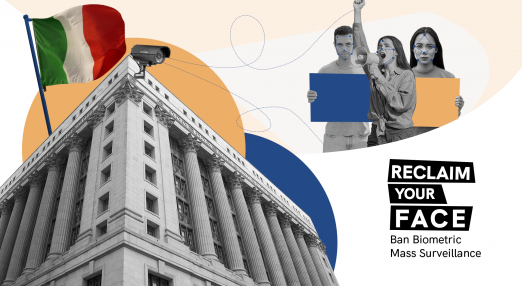
No place for emotion recognition technologies in Italian museums
An Italian museum trials emotion recognition systems, despite the practice being heavily criticised by data protection authorities, scholars and civil society. The ShareArt system collects, among others, age, gender and emotions of people. EDRi member Hermes Center called the DPA for an investigation.
Read more
-

Who will not be blocked by Facebook? SIN wins the first court battle
The District Court in Warsaw (Appellate Division) upheld its interim measures ruling from 2019 in which it temporarily prohibited Facebook from removing fan pages, run by the Polish NGO “SIN”, on Facebook and Instagram, as well as from blocking individual posts. This means that – until the case is decided – SIN’s activists may carry out their drugs-related education on the platform without concerns that they will suddenly lose the possibility to communicate with their audience. The decision is now final. EDRi's member Panoptykon Foundation sheds some light on the case and what it means on the broader scale.
Read more
-

They can hear you: 6 ways tech is listening to you
Voice recognition technology often violates human rights, and it’s popping up more and more. Recently EDRi's member Access Now called out Spotify for developing voice recognition tech that claims to be able to detect gender and emotional state, among other things. But it’s not just Spotify. Some of the most powerful companies in the world are deploying similar abusive tech because harvesting data about you is profitable. The market for voice recognition is growing, expected to be worth a whopping $26.8 billion by 2025.
Read more
-
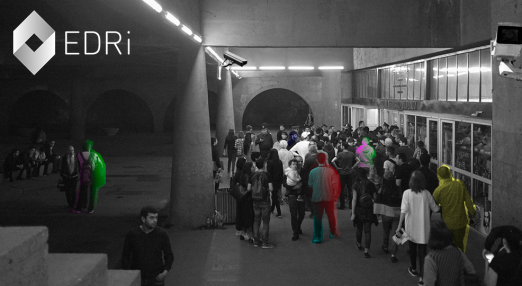
EU privacy regulators and Parliament demand AI and biometrics red lines
In their Joint Opinion on the AI Act, the EDPS and EDPB “call for [a] ban on [the] use of AI for automated recognition of human features in publicly accessible spaces, and some other uses of AI that can lead to unfair discrimination”. Taking the strongest stance yet, the Joint Opinion explains that “intrusive forms of AI – especially those who may affect human dignity – are to be seen as prohibited” on fundamental rights grounds.
Read more
-

EDRi-gram, 14 July 2021
Whilst EU laws say that each of us is innocent until proven guilty, the prevalence of biometric mass surveillance practices across Europe flips this on its head. Each of us is treated as suspicious until ‘proven’ innocent, by often discriminatory and persecutory deployments of systems that never should have been rolled out in the first place.
Read more
-

EDRi-gram, 30 June 2021
Covid 19 brought the often invisible power of tech into sharp focus as it fostered the digitalisation of our lives forcing us to rely more heavily on technology to meet all our needs. In response, EDRi emphasised that measures taken should not lead to discrimination of any form, and governments must remain vigilant to the disproportionate harms that marginalised groups can face.
Read more
-
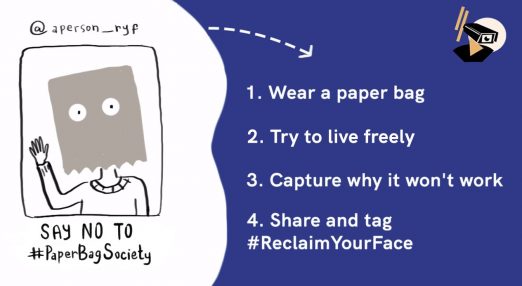
The #PaperBagSociety challenge
The #PaperBagSociety is a social media challenge part of the #ReclaimYourFace campaign that invites everyone to share online the impact of living life with a paperbag on the head. With it, we aim to raise awareness of how ridiculous is to avoid facial recognition technologies in public spaces and why we need to build an alternative future, free from biometric mass surveillance.
Read more
-
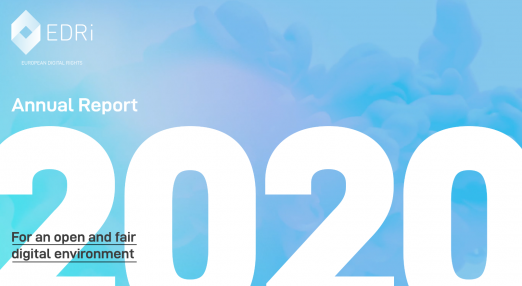
EDRis interactive Annual Report: A year in review of the digital rights field
Despite a challenging year, the European Digital Rights network has been relentlessly working to advocate for better digital policies, challenge creepy surveillance, inform and mobilise people across Europe. Read more about the need of digital rights and our impact in 2020 in our newly launched interactive Annual Report.
Read more
-

Workplace, public space: workers organising in the age of facial recognition
‘Surveillance capitalism’ is increasingly threatening workers’ collective action and the human right to public protest.
Read more
-
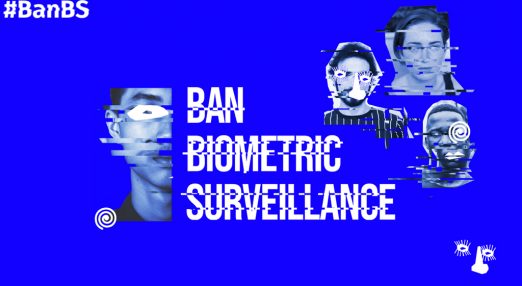
EDRi joins 178 organisations in global call to ban biometric surveillance
From protesters taking to the streets in Slovenia, to the subways of São Paulo; from so-called “smart cities” in India, to children entering French high schools; from EU border control experiments, to the racialised over-policing of people of colour in the US. In each of these examples, people around the world are increasingly and pervasively being subjected to toxic biometric surveillance. This is why EDRi has joined the global Ban Biometric Surveillance coalition, to build on our work in Europe as part of the powerful Reclaim Your Face campaign.
Read more
-

EDRi-gram, 16 June 2021
Some surveillance technologies are so dangerous that they inevitably cause far more problems than they solve. The use of facial recognition and remote biometric technologies in publicly accessible spaces enables mass surveillance and discriminatory targeted surveillance. In such cases, the potential for abuse is too great, and the consequences too severe. We must ban such practices once and for all.
Read more
